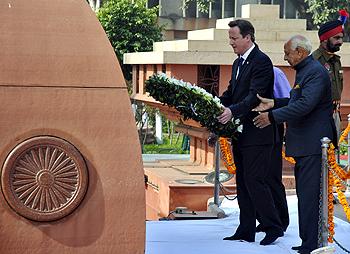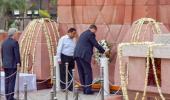I can't see what purpose can be served by an apology by a British government that cannot in any way be blamed for one sadistic man running amok 100 years ago, argues Sunanda K Datta-Ray.

Jallianwala Bagh was an unspeakable horror. Just reading the first section of Stanley Wolpert's Massacre at Jallianwala Bagh would make anyone's blood boil.
The victims deserve honour and respect. The date is as sacred as Independence Day. But I can't for the life of me see what purpose can be served by a formal apology by a British government that cannot in any way be blamed for one psychotically sadistic man running amok 100 years ago.
We might as well blame Reginald Dyer's Indian troops who actually gunned down the crowd.
The event isn't even part of Britain’s national consciousness, like the 'Black Hole of Calcutta'. Dyer's grandson was at boarding school in England with my son, but there was no ripple of awareness around him.
Back in England after a lifetime in India, my colleague Philip Crosland, the gentlest of liberals, told me apologetically that Dyer's Indian troops raised a fund for him. The implication was that the man was held in affection.
Yet, passions must once have reached fever pitch for a backwoods peer to mutter, 'If they are all like him the more they massacre the better!' about Lord Sinha after he made what many thought was a sensible speech during the House of Lords debate on cashiering Dyer.
Personal prejudice will linger no matter how abjectly Queen Elizabeth or Theresa May might apologise.
A literal application of the Book of Exodus's injunction that the iniquity of the fathers is visited unto the children into the third and fourth generations would mean punishing my son'/s innocent school friend. Not anyone in government.
Dyer acted on his own without consulting any colleague. In any case, this 'shameful scar on British Indian history' (quoting Mrs May) took place in a long-vanished imperial context. It cannot be compared with the US and Australian governments apologising to the American Indian and Aboriginal communities for injustices.
National governments remain responsible for everything that happens in the continuum of history. They can expect political dividend from gestures of atonement for the actions of predecessors. They cannot be compared with a temporarily occupying alien power that packed its bags and left India on agreed terms 72 years ago.
Apologies often boil down to money. Mark Field, a British minister, says London must consider the 'financial implications' of any gesture. That's what the quarrel between Japan and several East and South East Asian countries over so-called 'comfort women' during World War II was all about.
Japan gave South Korea a lump sum compensation of $800 million and set up the privately run, donations-based Asian Women's Fund further to compensate surviving victims across Asia.
A Tamil Malaysian human rights lawyer sued Britain in 2007 for an astronomical $4 trillion for atrocities allegedly suffered by Indian indentured labourers in colonial Malaya.
Indians can file similar suits over Fiji, the Caribbean, Mauritius and other places.
Today's ruling Indians can also themselves be sued. Varna Hindus (even those who have converted to Islam) owe a debt to the earlier lords of the land. Adivasis's land has been appropriated, forests denuded, mineral deposits ravaged, sacred hills violated, and entire lifestyles ruthlessly forced into the straitjacket of an alien civilisation.
There are many suspicions about how and why the police shot dead the immensely popular Maharaja Pravir Chand Bhanj Deo of Bastar.
Can India's pious and pompous political leaders ever adequately compensate the Santhal and Oraon, Onge and Jarawa, or even Nagas and Mizos for robbing them of their indigenous culture?
The Kolhan Raksha Sangh's leaders were charged with sedition when they claimed in 1981 that under Regulation XIII of 1833 (Wilkinson Rules), the Hos of Jharkhand were autonomous under the British crown.
No apology can restore Ooty's Todas to their once pre-eminent position in a network of communities. Without waiting for an empty apology, the Sentinelese took the law into their own hands and killed an American intruder.
The Nicobarese Holchu must resent curbs on their ancient freedom to interact with the Javanese. The deprivation of these indigenes helps caste Hindu advancement.
As the Washington Post once observed, 'issuing a national apology for slavery -- beyond its symbolism -- does not expand economic and educational opportunity, remove barriers to achievement, promote effective citizens, or build one America based on mutual respect and shared values.'
That also applies to India's dispossessed Adivasis. British politicians working for an apology mean well. But with so much to redress at home, so many crimes to expiate, Indians don't need the empty ritual.
It would only massage a few political egos











